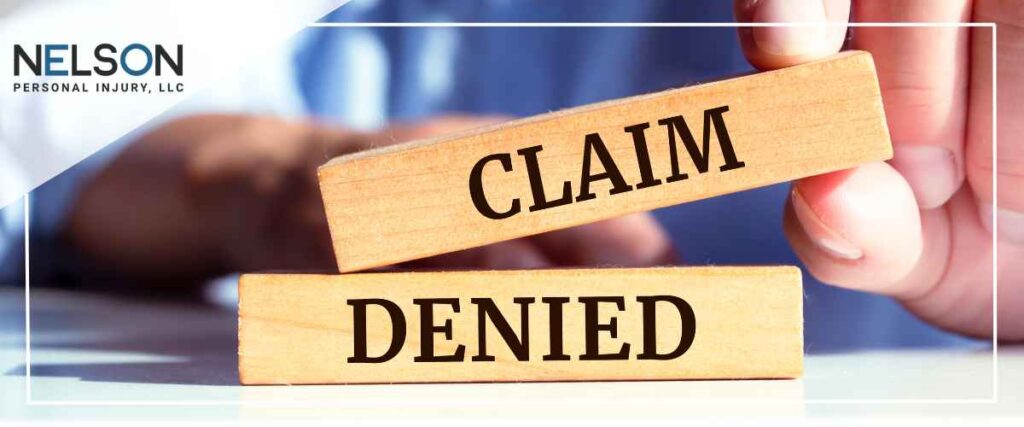Experiencing a personal injury can have a significant impact on your life. This is especially true when it results in medical bills, time off work, and other financial burdens. Filing an insurance claim is often the first step toward securing the compensation you need to cover these expenses. However, what if your claim gets denied?
At Nelson Personal Injury, LLC, our experienced personal injury lawyers in Minnesota are prepared to help you handle your denied insurance claim and help you recover the benefits and compensation you are entitled to.
Common Reasons for Denied Personal Injury Claims
Insurance companies may deny personal injury claims for various reasons. In order to have a valid personal injury claim, you must prove two things: liability (fault) and damages. Understanding these common grounds for denial can help you better prepare your case and avoid potential pitfalls:
Lack of Evidence
Insufficient evidence to support your claim is one of the primary reasons for denial. Insurance companies often require clear proof of the accident, documentation regarding your injuries, and the liability of the responsible party. This evidence often comes in the form of medical records, doctor’s reports, accident reports, witness statements, and any photographs or videos from the accident scene. Without supporting evidence, proving the validity of your claim becomes challenging, and an insurance company is more likely to deny your claim.
Disputed Liability
If the insurance company believes that their policyholder was not at fault or that you share a significant portion of the blame for the accident, they may deny your claim. This often requires a thorough investigation and sometimes legal assistance to establish the facts of what occurred, and who is at fault for causing the accident. Comparative negligence laws in some states can also affect the outcome if you are found partially at fault. For example, Minnesota is a modified comparative fault state. This means that you are unable to recover any damages if your fault exceeds that of the other involved party.
Policy Exclusions
The insurance policy may not cover certain types of accidents or injuries. Reviewing the language contained in the policy and its exclusions will help you understand any exclusions that apply to your situation. For instance, some policies may exclude intentional acts, or have specific exclusions for injuries caused by certain types of animals.
Late Filing
Failing to file your claim within the specified time frame can result in a denial. Each state has certain deadlines under which a claim must be settled or a lawsuit started. These deadlines are known as statutes of limitations. Insurance policies themselves may also have certain deadlines under which claims must be brought. It’s essential to report the accident and file your claim as soon as possible to avoid missing deadlines. Delays in filing can weaken your case and give the insurer a reason to deny your claim.
Pre-existing Conditions
If you had injuries that existed before the accident, the insurance company may try to dispute damages for any further medical costs or damages related to that injury or condition. Providing thorough medical documentation and support from your doctor can counter this claim. It’s important to differentiate between conditions before the accident and those that resulted from it. Detailed medical records and statements from healthcare providers can clarify this distinction.
Inconsistent Statements
Inconsistent or contradictory statements about the accident can lead to a claim denial. It’s crucial to provide accurate and consistent information throughout the claims process. Any discrepancies in your account of the incident can be used against you, so maintain clear communication and document every interaction with the insurance company.
By understanding these common reasons for denied personal injury claims, you can take proactive steps to strengthen your case and improve your chances of a successful outcome.
Steps to Take if Your Claim Is Denied
A denied insurance claim doesn’t mean the end of your pursuit for compensation. Here are the steps you should take if your personal injury claim is denied:
Understand the Reason for Denial
Carefully review the denial letter that is sent to you from the insurance company. The letter should explain the specific reasons for the denial. Understanding these reasons will help you determine the best course of action, and what options, if any, you may have.
Gather Additional Evidence
If your claim was denied due to insufficient evidence, gather additional documentation to support your case. This may include medical records, accident reports, witness statements, and accident scene photographs.
Request a Reconsideration
Contact the insurance company and request a reconsideration of your claim. Provide any new evidence or information addressing the reasons for the initial denial.
Seek Legal Assistance
If your appeal is unsuccessful or if you believe the denial was unjust, it’s time to seek legal guidance. A personal injury lawyer in Minnesota can evaluate your case, negotiate with the insurance company, and represent you in court if necessary.
How a Minnesota Injury Attorney Can Help
Fighting a denied personal injury claim can be challenging, but a skilled Minnesota injury attorney can provide invaluable assistance. Here’s how a personal injury lawyer can help you pursue the compensation you deserve:
Case Evaluation
An experienced attorney will review the details of your case, including the denial letter, evidence, and insurance policy. They will identify any weaknesses in the insurance company’s arguments and develop a strategy to strengthen your claim. They will use their knowledge to inform you whether a sufficient factual or legal basis exists to fight the denial.
Evidence Collection
Your attorney will help gather additional evidence to support your claim. This may include obtaining expert testimony, conducting further investigations, and compiling comprehensive medical documentation.
Negotiation with the Insurance Company
Insurance companies often respond more favorably when dealing with a knowledgeable attorney. Your lawyer will negotiate on your behalf, presenting a compelling case to the insurance company and seeking a fair settlement.
Filing a Lawsuit
If negotiations fail and the insurance company continues to deny your claim, your attorney can file a lawsuit on your behalf. They will represent you in court, presenting evidence and arguing your case to secure the compensation you deserve.
Ensuring Compliance with Legal Deadlines
Personal injury claims and lawsuits are subject to strict deadlines. Your attorney will ensure that all paperwork is filed correctly and within the required time frames, preventing your claim from being dismissed due to procedural errors.
Providing Peace of Mind
Dealing with a denied insurance claim can be stressful and time-consuming. By entrusting your case to a knowledgeable attorney, you can focus on your recovery while your lawyer handles the legal complexities.
Contact Our Minnesota Injury Attorney
A denied personal injury claim can be a significant setback, but it doesn’t have to be the end of your pursuit for justice. Understanding the reasons for the denial and taking the appropriate steps to challenge the decision can make a substantial difference in the outcome of your case.
At Nelson Personal Injury, LLC, our dedicated personal injury lawyers in Minnesota are committed to helping you navigate the claims process and fight for the compensation you deserve. If your personal injury claim has been denied, do not wait to contact our team for a free consultation to discuss your options.






